Jingran Su
AutoGUI: Scaling GUI Grounding with Automatic Functionality Annotations from LLMs
Feb 04, 2025



Abstract:User interface understanding with vision-language models has received much attention due to its potential for enabling next-generation software automation. However, existing UI datasets either only provide large-scale context-free element annotations or contextualized functional descriptions for elements at a much smaller scale. In this work, we propose the \methodname{} pipeline for automatically annotating UI elements with detailed functionality descriptions at scale. Specifically, we leverage large language models (LLMs) to infer element functionality by comparing the UI content changes before and after simulated interactions with specific UI elements. To improve annotation quality, we propose LLM-aided rejection and verification, eliminating invalid and incorrect annotations without human labor. We construct an \methodname{}-704k dataset using the proposed pipeline, featuring multi-resolution, multi-device screenshots, diverse data domains, and detailed functionality annotations that have never been provided by previous datasets. Human evaluation shows that the AutoGUI pipeline achieves annotation correctness comparable to trained human annotators. Extensive experimental results show that our \methodname{}-704k dataset remarkably enhances VLM's UI grounding capabilities, exhibits significant scaling effects, and outperforms existing web pre-training data types. We envision AutoGUI as a scalable pipeline for generating massive data to build GUI-oriented VLMs. AutoGUI dataset can be viewed at this anonymous URL: https://autogui-project.github.io/.
Joint Universal Adversarial Perturbations with Interpretations
Aug 03, 2024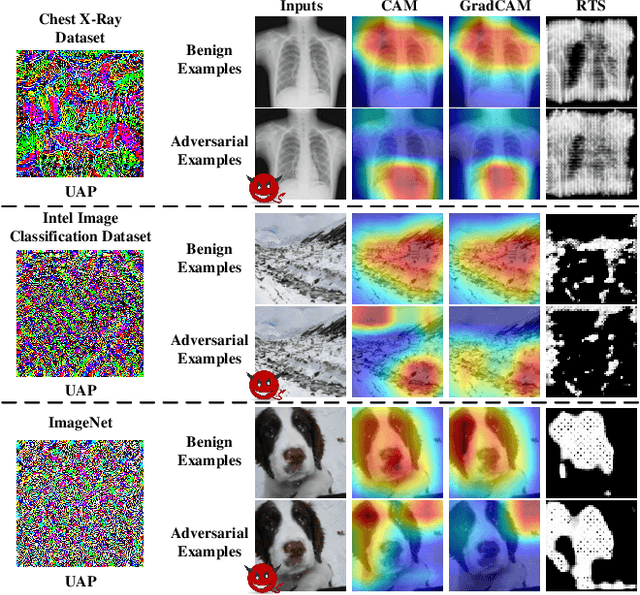

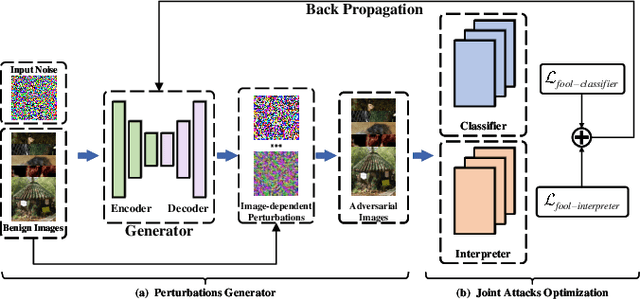
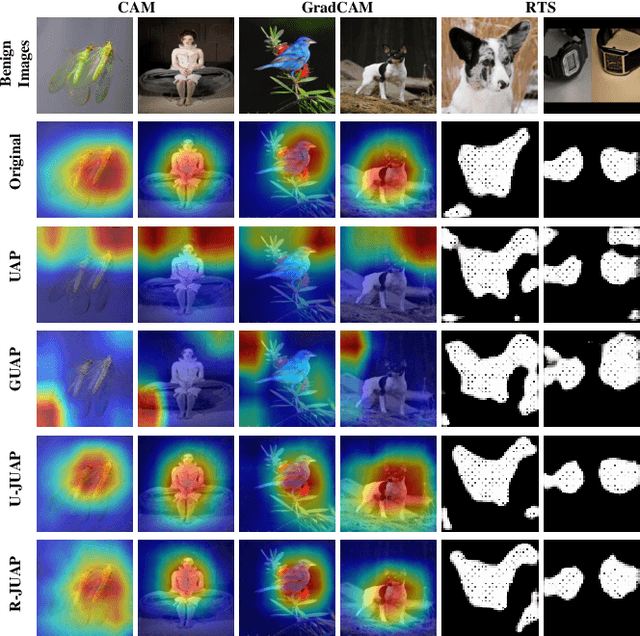
Abstract:Deep neural networks (DNNs) have significantly boosted the performance of many challenging tasks. Despite the great development, DNNs have also exposed their vulnerability. Recent studies have shown that adversaries can manipulate the predictions of DNNs by adding a universal adversarial perturbation (UAP) to benign samples. On the other hand, increasing efforts have been made to help users understand and explain the inner working of DNNs by highlighting the most informative parts (i.e., attribution maps) of samples with respect to their predictions. Moreover, we first empirically find that such attribution maps between benign and adversarial examples have a significant discrepancy, which has the potential to detect universal adversarial perturbations for defending against adversarial attacks. This finding motivates us to further investigate a new research problem: whether there exist universal adversarial perturbations that are able to jointly attack DNNs classifier and its interpretation with malicious desires. It is challenging to give an explicit answer since these two objectives are seemingly conflicting. In this paper, we propose a novel attacking framework to generate joint universal adversarial perturbations (JUAP), which can fool the DNNs model and misguide the inspection from interpreters simultaneously. Comprehensive experiments on various datasets demonstrate the effectiveness of the proposed method JUAP for joint attacks. To the best of our knowledge, this is the first effort to study UAP for jointly attacking both DNNs and interpretations.
SheetCopilot: Bringing Software Productivity to the Next Level through Large Language Models
May 30, 2023



Abstract:Computer end users have spent billions of hours completing daily tasks like tabular data processing and project timeline scheduling. Most of these tasks are repetitive and error-prone, yet most end users lack the skill of automating away these burdensome works. With the advent of large language models (LLMs), directing software with natural language user requests become a reachable goal. In this work, we propose a SheetCopilot agent which takes natural language task and control spreadsheet to fulfill the requirements. We propose a set of atomic actions as an abstraction of spreadsheet software functionalities. We further design a state machine-based task planning framework for LLMs to robustly interact with spreadsheets. We curate a representative dataset containing 221 spreadsheet control tasks and establish a fully automated evaluation pipeline for rigorously benchmarking the ability of LLMs in software control tasks. Our SheetCopilot correctly completes 44.3\% of tasks for a single generation, outperforming the strong code generation baseline by a wide margin. Our project page:https://sheetcopilot-demo.github.io/.
A Comprehensive Survey on Trustworthy Recommender Systems
Sep 21, 2022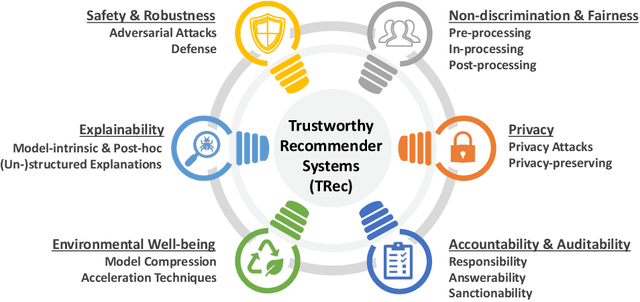


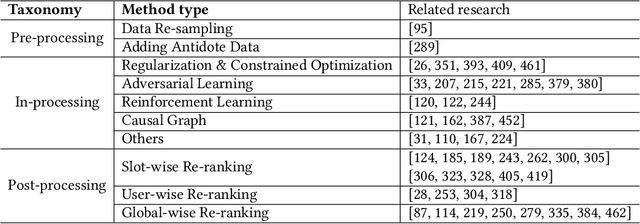
Abstract:As one of the most successful AI-powered applications, recommender systems aim to help people make appropriate decisions in an effective and efficient way, by providing personalized suggestions in many aspects of our lives, especially for various human-oriented online services such as e-commerce platforms and social media sites. In the past few decades, the rapid developments of recommender systems have significantly benefited human by creating economic value, saving time and effort, and promoting social good. However, recent studies have found that data-driven recommender systems can pose serious threats to users and society, such as spreading fake news to manipulate public opinion in social media sites, amplifying unfairness toward under-represented groups or individuals in job matching services, or inferring privacy information from recommendation results. Therefore, systems' trustworthiness has been attracting increasing attention from various aspects for mitigating negative impacts caused by recommender systems, so as to enhance the public's trust towards recommender systems techniques. In this survey, we provide a comprehensive overview of Trustworthy Recommender systems (TRec) with a specific focus on six of the most important aspects; namely, Safety & Robustness, Nondiscrimination & Fairness, Explainability, Privacy, Environmental Well-being, and Accountability & Auditability. For each aspect, we summarize the recent related technologies and discuss potential research directions to help achieve trustworthy recommender systems in the future.
 Add to Chrome
Add to Chrome Add to Firefox
Add to Firefox Add to Edge
Add to Edge